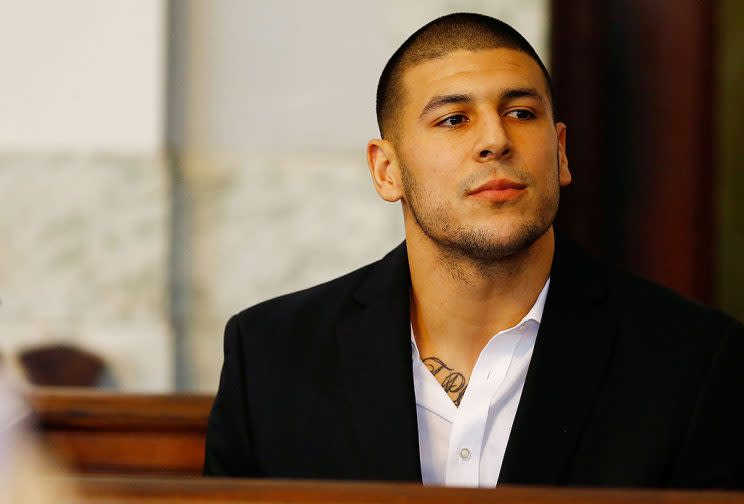Aaron Hernandez's estate entitled to NFL pension; other revenue in question
Aaron Hernandez’s suicide put his estate and its financial future in a legal limbo, and lawyers for the estate, the New England Patriots, and the NFL will need to sort through contracts and obligations to determine exactly how much money the estate might still be owed.
One of the key reasons behind the fact that the Hernandez story remains unfinished, per the Boston Globe, is Massachusetts’ legal concept of “abatement ab initio,” in which the legal status of a deceased individual engaged in appeals reverts to the status it was at the beginning of the case — i.e., innocent. But then, the rationale goes, if Hernandez is technically “innocent,” wouldn’t his estate be entitled to the remainder of his guaranteed NFL contract and pension? Hernandez is both the first player to be convicted of first-degree murder while under contract, and also the first player to die under these same circumstances.
The Patriots withheld the final $5.91 million of Hernandez’s guaranteed contract after Hernandez was arrested in connection with the death of Odin Lloyd in June 2013. Hernandez was later convicted of murder in that case, though he was found not guilty earlier this month in connection with the deaths of two other men in 2012.
According to the Globe, Hernandez and the Patriots settled the matter of the outstanding guaranteed salary after Hernandez filed a grievance in 2014. The details aren’t public, but Hernandez almost certainly violated the terms of his contract. Hernandez signed the contract in August 2012, shortly after the deaths of Daniel de Abreu and Safiro Furtado in Boston, the case for which Hernandez was found not guilty.
Hernandez’s contract, according to the Globe, included a line which read, “Player represents and warrants to the Club that … no circumstances exist that would prevent Player’s continuing availability to the Club for the duration of the Contract.” In addition, the NFL’s collective bargaining agreement includes language which reads, “any player who … is unavailable to the team due to conduct by him that results in his incarceration … may be required to forfeit signing bonus . . . for each League Year in which a Forfeitable Breach occurs.”
However, Hernandez’s estate is apparently still eligible to receive whatever funding remains in his NFL pension. Hernandez played three years and started playing in 2012, the minimum necessary to receive a pension under certain provisions. It’s uncertain how much remains in Hernandez’s pension, though his estate still faces likely civil suit challenges from the families of his victim and others.

____
Jay Busbee is a writer for Yahoo Sports and the author of EARNHARDT NATION, on sale now at Amazon or wherever books are sold. Contact him at jay.busbee@yahoo.com or find him on Twitter or on Facebook.
More from Yahoo Sports:
• Jeff Passan: What isn’t baseball’s best player good at?
• LeBron’s epic performance lifts Cavs in historic playoff comeback
• Kevin Iole: Former NFL star preps boxer for major bout
• 2017 NFL schedule: Most intriguing matchups

